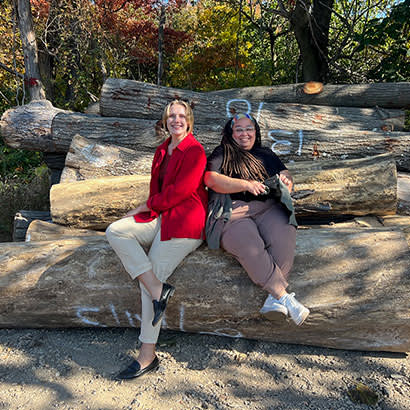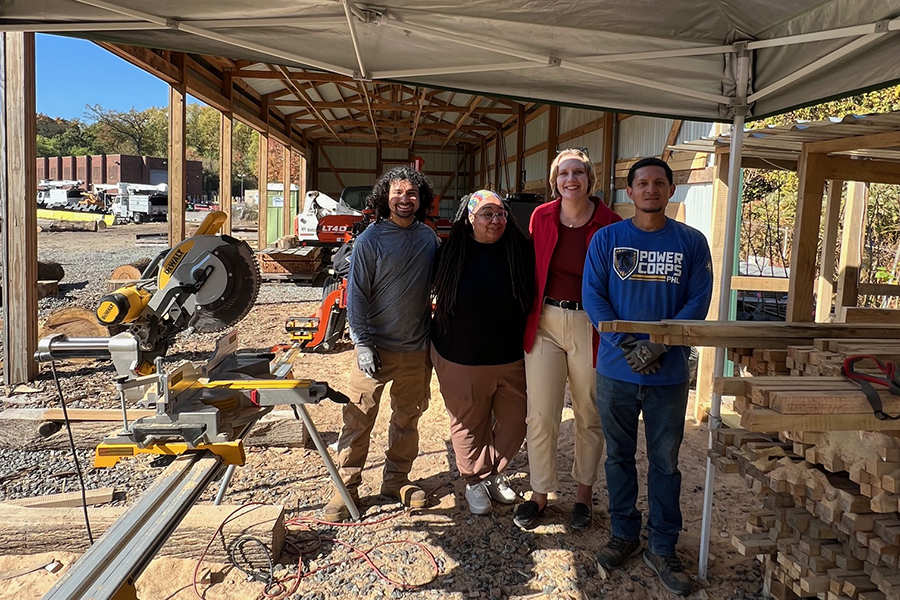
Pictured: Barbara Kapustin, NRPA program manager, community and environmental resiliency (left), and Ayanna Williams, NRPA director of environmental and community resilience on a site visit in Philadelphia.
The view of the Philadelphia skyline from the banks of the Schuylkill River highlights the convergence of nature into city life. The natural world's presence is felt throughout the urban landscape and can be found in the most unsuspecting places. One of these places is in the city’s waste. You can tell a lot about a city’s population based on what they discard, but even more through how they choose to do it.
Recycling has been a part of Philadelphia Parks & Recreation (PPR) for more than four decades. Through various mayoral administrations, park and recreation staff members, and changes to the city itself, PPR’s recycling efforts have been a constant initiative. Throughout this long tenure, the way that PPR has approached recycling has shifted with community needs and available resources. From composting to single-stream recycling, PPR has been able to grow its recycling efforts by leveraging public-private partnerships, education and collaboration across local government agencies. PPR graciously allowed me and NRPA Director of Environmental and Community Resilience Ayanna Williams to meet with them in person to gain a better understanding of recycling in a parks and recreation context.
A Compelling Model for Urban Sustainability
Our conversations with park and recreation staff highlighted their enthusiasm and fun, competitive nature. We spoke about opportunities to create healthy competition between recreation centers, seeing which recreation center can collect the most recycling material. By focusing on increasing recycling bin access and fostering staff and public enthusiasm, Philadelphia is making significant strides in waste reduction. This comprehensive approach demonstrates how parks and recreation can be a powerful catalyst for environmental education and community engagement. By transforming waste management into an opportunity for learning, job creation and environmental stewardship, Philadelphia offers a compelling model for urban sustainability.
Our site visit to Philadelphia allowed us to peek behind the curtain of recycling and waste management for the City of Philadelphia. We started our site visit with a tour of the Fairmount Park Organic Recycling Center, an impressive organic materials composting operation situated within Philadelphia’s largest municipal park. Here, local residents can dispose of their organic materials and pick up composted products — up to 30 gallons of compost, mulch and manure twice per week for no charge. Departments for the City of Philadelphia and local businesses also can dispose of their materials here, saving the city money while also generating revenue. Businesses can purchase these materials, and parks and recreation staff utilize them in park maintenance projects.

The Power of Partnerships
Alongside the long rows of drying compost and mulch sits the Reforestation Hub, a public-private partnership with Cambium Carbon (a Circular Economy innovator business that tackles environmental challenges in supply chains), PowerCorps (a Job Corps organization that provides youth paid programs in sustainable careers) and the City of Philadelphia. The Reforestation Hub, through the power of these partnerships, brings together recycling, workforce development, and environmental stewardship. Here PowerCorps members assist with urban forestry efforts, milling and operations, working to use the timber brought to the Fairmount Park Organic Recycling Center for City projects. This impressive example highlights the success of combining recycling and workforce program initiatives to meet public needs on multiple levels.

Our tour of PPR’s recycling efforts allowed us to meet with another key player in Philadelphia's recycling ecosystem, Tim Bennett of Bennett Compost. Located in Northeast Philadelphia, Bennett Compost and PPR have a public-private partnership that allows Bennett to operate a compost facility on park land in exchange for collecting food waste from PPR sites and returning finished compost to farms and gardens in the PPR network. It collects food waste for various programs, including more than 100 recreation centers and park programs. At this facility, more than two million pounds of food waste is processed into compost. Their innovative "Bennet Bucket" program integrates with the city's existing recycling and trash routes. From a fairly small facility, Bennett Compost works with roughly 6,000 residential clients and more than 100 companies to help turn Philadelphia’s food waste into nutrient-rich compost. By working with various clients, as well as the Philadelphia Zoo and the City of Philadelphia, to collect all required materials for great compost, Bennett Compost has been able to provide a valuable public service while minimizing waste.

Park and recreation staff work in conjunction with Bennett Compost and other partners to provide necessary training around composting best practices to PPR staff at participating sites and youth in after-school and summer programs. PPR’s Sustainability team, led by Sustainability Director Natalie Walker, plays a crucial role in these efforts. Natalie and her team have worked to uplift composting and single-stream recycling efforts in recreation centers across Philadelphia. Recreation center and other frontline park and recreation staff understand the challenges and opportunities for community-centered solutions that come with long-term initiatives such as recycling. Despite issues of illegal waste dumping, limited resources and tenuous public support, staff are willing to try reimagined initiatives seeking the sustained success of recycling efforts. Ensuring both public and staff buy into recycling initiatives allows for greater chances of success.
Our site visit with PPR reinforced NRPA's belief that parks and recreation is a powerful conduit for recycling efforts and community education. Recycling in Philadelphia is more than managing waste — it's creating a more connected, sustainable urban ecosystem where discarded items have the potential for renewal and repurpose.
Barbara Kapustin (she/her) is a Program Manager for Community and Environmental Resiliency at NRPA.
Special thank you to everyone who made this possible, and Niagara Cares for partnering with NRPA in our recycling initiatives.
Special thank you to the following individuals:
- Fairmount Park Organic Recycling Center: George McNally, Dan Schulke
- PowerCorps: Carlos Alvarez
- Bennett Compost: Tim Bennett
- Greenwood Recycling Office: Suzanne Greenwood
- Lloyd Hall Recreation Center: Daniel Maier
- Mander Recreation Center: Will Kearse


